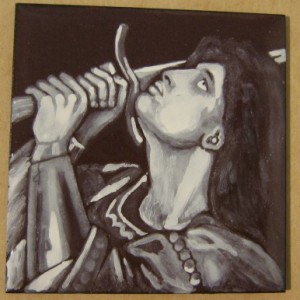Joan of Arc
Grisaille is a technique that was perfected in the 15th century by the great painted enamel houses of Limoges: Penicaud, Limousin and Reymond.
I first saw grisaille enamels in the Taft Museum in Cincinnati and I was smitten.
My drawing and painting skills were weak – so I had to spend a lot of time honing them, and learning techniques that would make the pieces affordable (unlike the traditional pieces which were fired as many as 35 times)
 |
| sifted |
So I start with a stencil which I make myself based on my design.
I sift a thin layer of opalescent white which serves two purposes: it gives me an outline to work within, and it reduces the chances of the painted layers ‘crazing’ (breaking apart with tiny cracks) as a painted enamel is likely to do on top of a regularly fired enamel.
 |
| scratched |
I carefully check my drawing and scratch areas which will need to stay dark throughout the process
 |
| fired |
When it is fired this layer is barely noticeable
 |
| painted |
I then add the paint (China paint) in thin layers.
 |
| fired |
Each time it is fired, the white softens
 |
| painted (fired picture missing) |
I work from the shadows towards the highlights – which is a little unusual, as one sketches toward the shadows. So one has to think backwards. And always remember how much the paint softens when it is fired (allowing previous layers to show through
 |
| painted |
 |
| fired |
Each time I add the paint – I am thinking of what needs to be highlighted. The trick is in learning to see the drawing in a series of 2 dimensional planes: like layered transparencies.
 |
| painted (fired picture missing) |
Each time I paint a layer, I cover a smaller area, building up the high points, avoiding areas of shadow
 |
| painted |
I continue to add the enamel paint in thin layers, The final layer of paint is usually just a few points. (note the finger tips and back of the hand).
Usually it takes between 5 and 9 layers to build up the effect I want
 |
| final fire |
This piece is based on a Dante Gabriel Rossetti painting. If you would like to see the original click here.
While copying another work is often frowned upon it is the most useful exercise in learning a new technique. It is important to focus on technique rather than composition when learning a new process and this is one of the best ways to do it.
Grisaille has now become one of my main techniques – I have an extensive line of jewellery and framed panels.
Now I generally work from photographs, but I am getting more comfortable with this kind of composition and look forward to creating more original works.

Thanks a lot for the tutorial. Enameling offers so many possibilities that we never stop learning. How steep is the learning curve for grisaille?(How many trial before producing anything decent).
You are welcome! As for a learning curve – it took me six years! In the beginning I didn't know what materials to use etc. so there was a lot of trial and error. I tried a bunch of sifting and wet-packing techniques – but I wasn't happy with them. With the China paint – the firing times/temperatures are very precise – the window of failure is about 10 seconds. So lots of good firing experience really helps. I have more videos on YouTube if you are interested http://www.youtube.com/watch?v=t05vaqTj9S4&feature=plcp